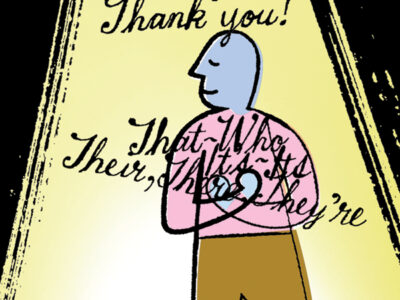HOWARD Hornstein D’67 was a pediatric dentist who delighted in gathering with friends to sing sea chanteys — work songs made popular aboard 19th-century sailing ships, and later on land, along railroads and in lumber camps. At festivals the Ancient Mariners Chanteymen brought audiences to laughter and tears with their salty tunes and mournful ballads.
Today Hornstein is dying. In the advanced stages of a degenerative muscular condition known as ALS, or Lou Gehrig’s Disease, Hornstein can stir only his eyes, and they, too, are getting weaker. But even as his muscles have failed him, forcing him to give up his dental practice, and then his singing, Hornstein finds that he has much to teach others about living.
The most dramatic example comes from the publication last year of his book, Favorite Sea Songs of the Ancient Mariners Chanteymen, which he completed using only his right eye. Hornstein was contacted by e-mail in February at his Guilford, Conn., home and asked if he would answer a few questions about his condition and his passionate hobby. His enthusiastic response came — unexpectedly — seven days later: “Great! Let’s do it.”
It is computer technology — and Hornstein’s remarkable will — that make communication still possible. First he peers into an eyepiece which displays a chart of keyboard characters and tracks the movement of his right pupil. As he focuses on each letter, it appears on his computer screen. At Hornstein’s optical command, a synthesizer converts the text into a digitized voice. Not long ago, he could speak, or type, at a rate of one character per second, but his pace is slower now.
Hornstein, who appeared with other ALS patients on a recent episode of 60 Minutes, contemplated suicide several years ago. What stopped him was the memory of a man he knew while he was enrolled at Penn’s School of Dental Medicine — and working at the Penn Diner at 40th and Spruce. “The owner, Jimmy, was a remarkable fellow,” Hornstein recalls. “He was always in a good mood and always had something positive to say. He was a natural motivator. Seeing this style really made me curious, so one day I went up to Jimmy and asked him, ‘How do you do it?’
“Jimmy made me see that life is all about choices,” Hornstein writes. “When you cut away all the junk, every situation is a choice. You choose how you react to situations.” Although Hornstein lost touch with Jimmy after he left Penn, he remembered his philosophy.
In 1992, Hornstein was diagnosed with ALS and given two to three years to live. “I knew very well that my remaining time on earth would be accompanied by the most horrible physical changes I could imagine,” he says. “One day, when I still could drive and no one was home, I went into the barn, locked all the doors, and searched my soul, prior to starting my car engine. Jimmy’s voice said to me, ‘You have two choices. You can choose to live, or you can choose to die. If I had half your ability and determination, I’d choose to live. This could be the greatest adventure of your life!’
“I decided, since Hornsteins are not quitters, not to turn the key. I have never regretted that decision for one minute. And I can share two things I’ve learned with everyone today. First, choose to live life fully!! And second, attitude, after all, is everything.”
When he became unable to drive and to walk, to sing and to play the fife and concertina with the Chanteymen, Hornstein wrote his book, relying on his two nurses to wheel him into libraries for research. The product is a conversational collection of musical scores, lyrics (including some written by him), and historical detail about chanteys. About 400 books had been sold as of February, recovering two-thirds of his $12,000 investment. Profits will go to ALS research.
According to Hornstein, the earliest reference to nautical “chanteying as we know it today” appeared in 1493, when a Dominican friar named Felix Fabri, traveling on a Venetian galley, wrote of “mariners who sing when work is going on — [There is] a concert between one who sings out orders and the laborers who sing in response.” But it was in the last hundred years of sail, from 1820 to 1920, that the musical form flourished.
The word’s origins remain in dispute. Some believe it comes from the English chant, or from the French chantez, which means sing. Others believe it derived from the crudely-built shanties of American work camps, occupied — as Hornstein writes in his book — by “hard working, drinking, nomadic men who sang all day to ease their burden of work.” Regardless of the etymology, chanteys typically took the form of short, often improvised, solo passages called out by a lead singer, or chanteyman, followed with a chorus sung by the rest of the sailing crew. Varying in tempo and rhythm, the songs were chosen based on the work that had to be done. They served both to motivate sailors and coordinate their movements. Today, they inspire Hornstein to go on with the task of living.
Hornstein’s favorite chantey, he says, is “Cape Cod Girls,” a ditty sung while raising anchors and pumping water out of ships. “The lyrics are woven around the many (humorous) uses for codfish parts” and were varied to poke fun at the hometowns of different crew members, he explains. A modified version was also heard on British ships. For example:
Liverpool gals ain’t got no combs,
They comb their hair with kipper back bones …
The Chanteymen still practice at Hornstein’s home every Thursday night while he arranges their music. Even with his head held up by a cervical collar, and his every breath completed by a respirator, he reports, “I can write the lead and harmony parts via computer, make tapes of the computer playing each part, then give everyone their tape. It ain’t like playing and singing, but at least I’m still involved with my friends.”
Hornstein also finds much to live for in his “wonderful nurses and spectacular children (a 27-year-old son, Daniel, and a daughter, Robin, who is a college senior).” Daniel, he notes, is sailing around the world on a three-masted square-rigged ship, visiting classrooms at various ports to teach students about the environment. Back on land, Hornstein continues to teach his own lessons, by encouraging everyone to appreciate the music around them.
To order a book, write to Hornstein at 165 Sperry Drive, Guilford, CT 06437. The price is $25.00, $35.00 to include a musical CD of the Chanteymen.




